BUS851 - International Human Resource Management Challenges Report
VerifiedAdded on 2023/01/13
|10
|2588
|83
Report
AI Summary
This report addresses the challenges of International Human Resource Management (IHRM) in a global business context. It begins with an introduction to international business and IHRM, highlighting the impact of globalization and the complexities of managing a multinational workforce. The report then delves into specific IHRM issues, including cultural diversity, compliance with local and international laws, expatriate programs, and compensation and benefits. The report analyzes the challenges associated with managing a diverse workforce, navigating varying labor laws, and designing effective expatriate programs. The report further examines the complexities of designing compensation and benefits packages that align with the economic and legal conditions of different countries. Finally, the report suggests strategies for addressing these IHRM challenges, such as recruiting experienced HR managers, carefully managing expatriate programs, promoting workplace diversity, and adapting compensation and benefits plans to local economic conditions. The report concludes by emphasizing the importance of effective IHRM for the success of multinational organizations in the global market.
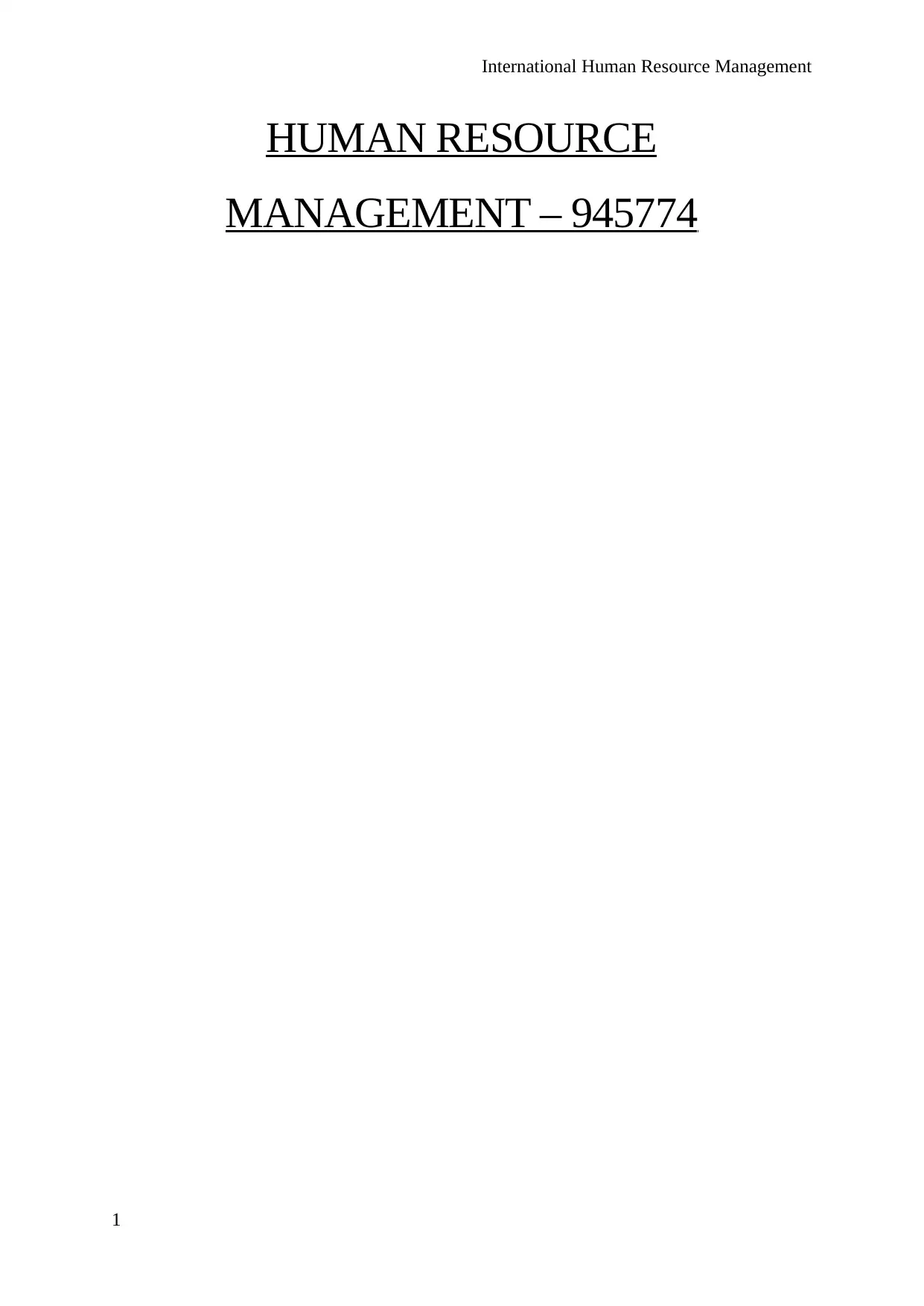
International Human Resource Management
HUMAN RESOURCE
MANAGEMENT – 945774
1
HUMAN RESOURCE
MANAGEMENT – 945774
1
Secure Best Marks with AI Grader
Need help grading? Try our AI Grader for instant feedback on your assignments.
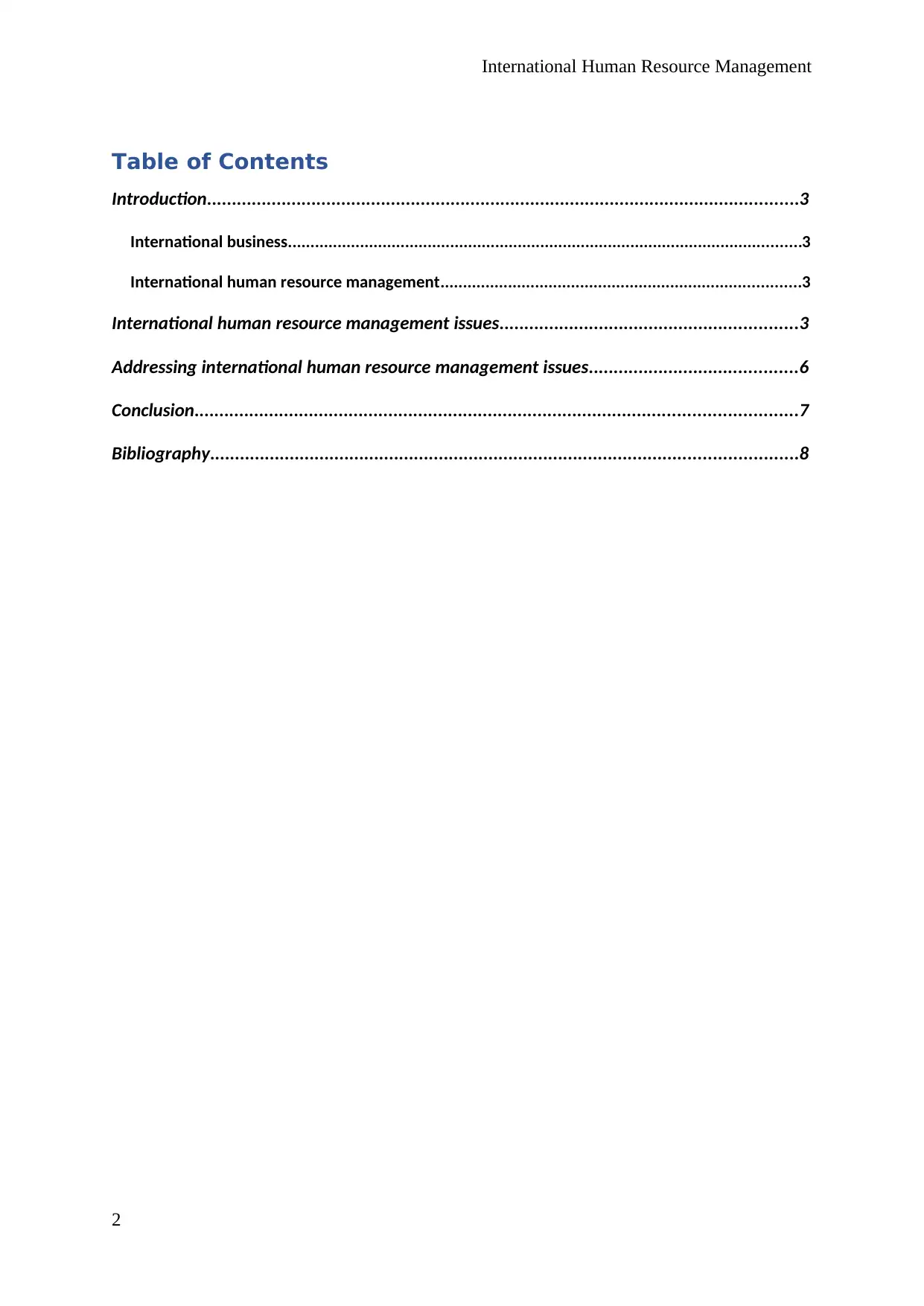
International Human Resource Management
Table of Contents
Introduction.......................................................................................................................3
International business..................................................................................................................3
International human resource management................................................................................3
International human resource management issues............................................................3
Addressing international human resource management issues..........................................6
Conclusion.........................................................................................................................7
Bibliography......................................................................................................................8
2
Table of Contents
Introduction.......................................................................................................................3
International business..................................................................................................................3
International human resource management................................................................................3
International human resource management issues............................................................3
Addressing international human resource management issues..........................................6
Conclusion.........................................................................................................................7
Bibliography......................................................................................................................8
2
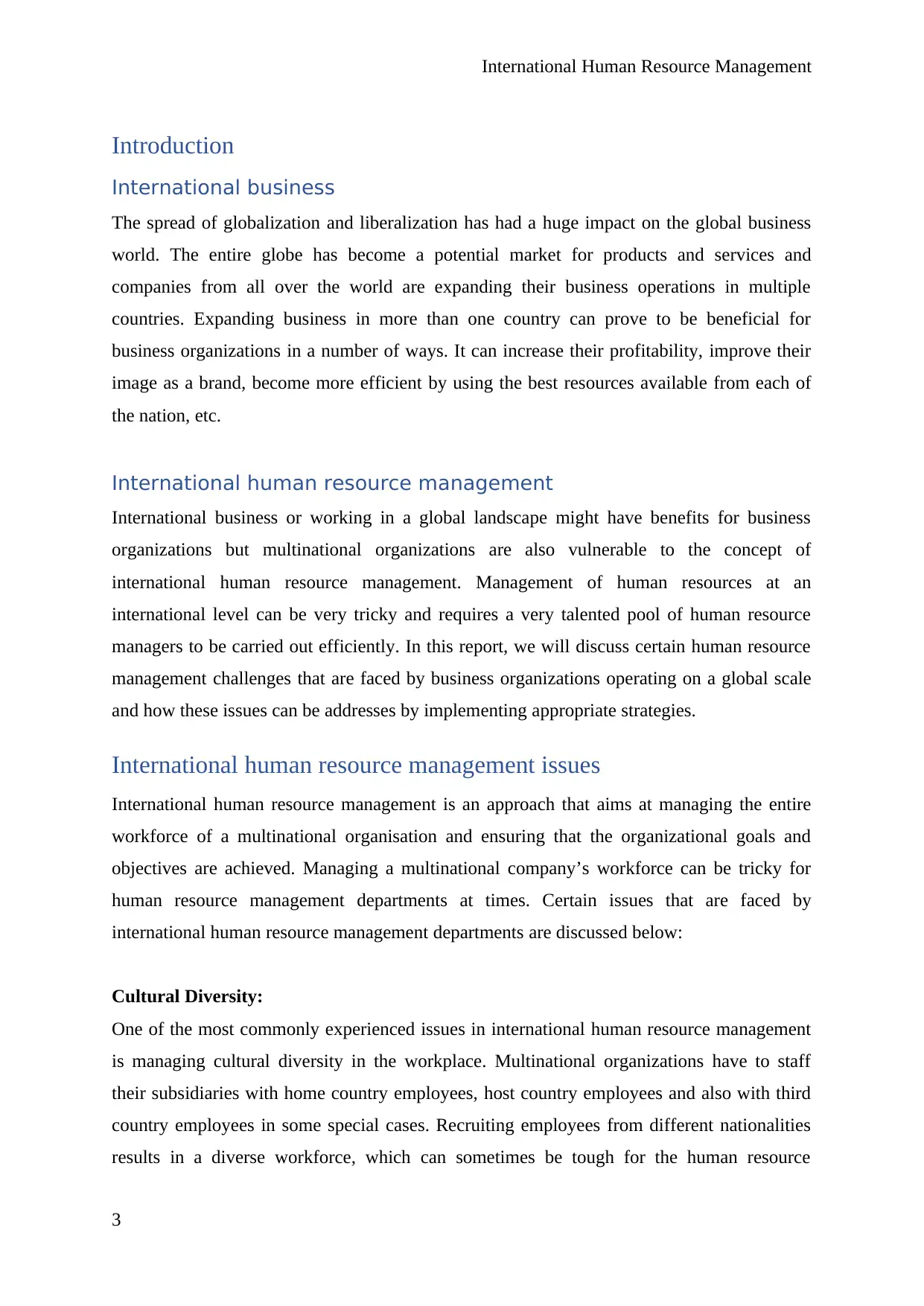
International Human Resource Management
Introduction
International business
The spread of globalization and liberalization has had a huge impact on the global business
world. The entire globe has become a potential market for products and services and
companies from all over the world are expanding their business operations in multiple
countries. Expanding business in more than one country can prove to be beneficial for
business organizations in a number of ways. It can increase their profitability, improve their
image as a brand, become more efficient by using the best resources available from each of
the nation, etc.
International human resource management
International business or working in a global landscape might have benefits for business
organizations but multinational organizations are also vulnerable to the concept of
international human resource management. Management of human resources at an
international level can be very tricky and requires a very talented pool of human resource
managers to be carried out efficiently. In this report, we will discuss certain human resource
management challenges that are faced by business organizations operating on a global scale
and how these issues can be addresses by implementing appropriate strategies.
International human resource management issues
International human resource management is an approach that aims at managing the entire
workforce of a multinational organisation and ensuring that the organizational goals and
objectives are achieved. Managing a multinational company’s workforce can be tricky for
human resource management departments at times. Certain issues that are faced by
international human resource management departments are discussed below:
Cultural Diversity:
One of the most commonly experienced issues in international human resource management
is managing cultural diversity in the workplace. Multinational organizations have to staff
their subsidiaries with home country employees, host country employees and also with third
country employees in some special cases. Recruiting employees from different nationalities
results in a diverse workforce, which can sometimes be tough for the human resource
3
Introduction
International business
The spread of globalization and liberalization has had a huge impact on the global business
world. The entire globe has become a potential market for products and services and
companies from all over the world are expanding their business operations in multiple
countries. Expanding business in more than one country can prove to be beneficial for
business organizations in a number of ways. It can increase their profitability, improve their
image as a brand, become more efficient by using the best resources available from each of
the nation, etc.
International human resource management
International business or working in a global landscape might have benefits for business
organizations but multinational organizations are also vulnerable to the concept of
international human resource management. Management of human resources at an
international level can be very tricky and requires a very talented pool of human resource
managers to be carried out efficiently. In this report, we will discuss certain human resource
management challenges that are faced by business organizations operating on a global scale
and how these issues can be addresses by implementing appropriate strategies.
International human resource management issues
International human resource management is an approach that aims at managing the entire
workforce of a multinational organisation and ensuring that the organizational goals and
objectives are achieved. Managing a multinational company’s workforce can be tricky for
human resource management departments at times. Certain issues that are faced by
international human resource management departments are discussed below:
Cultural Diversity:
One of the most commonly experienced issues in international human resource management
is managing cultural diversity in the workplace. Multinational organizations have to staff
their subsidiaries with home country employees, host country employees and also with third
country employees in some special cases. Recruiting employees from different nationalities
results in a diverse workforce, which can sometimes be tough for the human resource
3
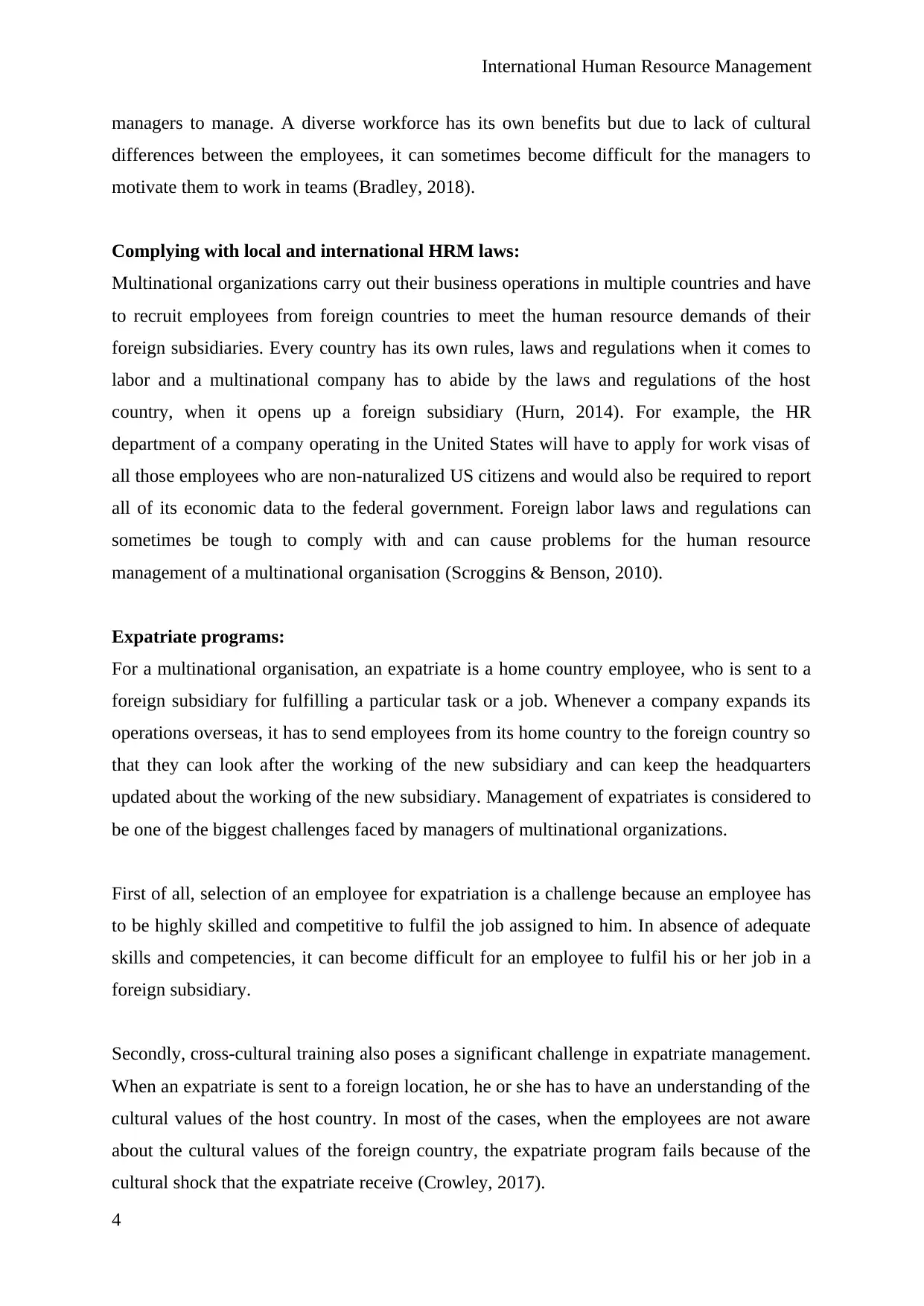
International Human Resource Management
managers to manage. A diverse workforce has its own benefits but due to lack of cultural
differences between the employees, it can sometimes become difficult for the managers to
motivate them to work in teams (Bradley, 2018).
Complying with local and international HRM laws:
Multinational organizations carry out their business operations in multiple countries and have
to recruit employees from foreign countries to meet the human resource demands of their
foreign subsidiaries. Every country has its own rules, laws and regulations when it comes to
labor and a multinational company has to abide by the laws and regulations of the host
country, when it opens up a foreign subsidiary (Hurn, 2014). For example, the HR
department of a company operating in the United States will have to apply for work visas of
all those employees who are non-naturalized US citizens and would also be required to report
all of its economic data to the federal government. Foreign labor laws and regulations can
sometimes be tough to comply with and can cause problems for the human resource
management of a multinational organisation (Scroggins & Benson, 2010).
Expatriate programs:
For a multinational organisation, an expatriate is a home country employee, who is sent to a
foreign subsidiary for fulfilling a particular task or a job. Whenever a company expands its
operations overseas, it has to send employees from its home country to the foreign country so
that they can look after the working of the new subsidiary and can keep the headquarters
updated about the working of the new subsidiary. Management of expatriates is considered to
be one of the biggest challenges faced by managers of multinational organizations.
First of all, selection of an employee for expatriation is a challenge because an employee has
to be highly skilled and competitive to fulfil the job assigned to him. In absence of adequate
skills and competencies, it can become difficult for an employee to fulfil his or her job in a
foreign subsidiary.
Secondly, cross-cultural training also poses a significant challenge in expatriate management.
When an expatriate is sent to a foreign location, he or she has to have an understanding of the
cultural values of the host country. In most of the cases, when the employees are not aware
about the cultural values of the foreign country, the expatriate program fails because of the
cultural shock that the expatriate receive (Crowley, 2017).
4
managers to manage. A diverse workforce has its own benefits but due to lack of cultural
differences between the employees, it can sometimes become difficult for the managers to
motivate them to work in teams (Bradley, 2018).
Complying with local and international HRM laws:
Multinational organizations carry out their business operations in multiple countries and have
to recruit employees from foreign countries to meet the human resource demands of their
foreign subsidiaries. Every country has its own rules, laws and regulations when it comes to
labor and a multinational company has to abide by the laws and regulations of the host
country, when it opens up a foreign subsidiary (Hurn, 2014). For example, the HR
department of a company operating in the United States will have to apply for work visas of
all those employees who are non-naturalized US citizens and would also be required to report
all of its economic data to the federal government. Foreign labor laws and regulations can
sometimes be tough to comply with and can cause problems for the human resource
management of a multinational organisation (Scroggins & Benson, 2010).
Expatriate programs:
For a multinational organisation, an expatriate is a home country employee, who is sent to a
foreign subsidiary for fulfilling a particular task or a job. Whenever a company expands its
operations overseas, it has to send employees from its home country to the foreign country so
that they can look after the working of the new subsidiary and can keep the headquarters
updated about the working of the new subsidiary. Management of expatriates is considered to
be one of the biggest challenges faced by managers of multinational organizations.
First of all, selection of an employee for expatriation is a challenge because an employee has
to be highly skilled and competitive to fulfil the job assigned to him. In absence of adequate
skills and competencies, it can become difficult for an employee to fulfil his or her job in a
foreign subsidiary.
Secondly, cross-cultural training also poses a significant challenge in expatriate management.
When an expatriate is sent to a foreign location, he or she has to have an understanding of the
cultural values of the host country. In most of the cases, when the employees are not aware
about the cultural values of the foreign country, the expatriate program fails because of the
cultural shock that the expatriate receive (Crowley, 2017).
4
Secure Best Marks with AI Grader
Need help grading? Try our AI Grader for instant feedback on your assignments.
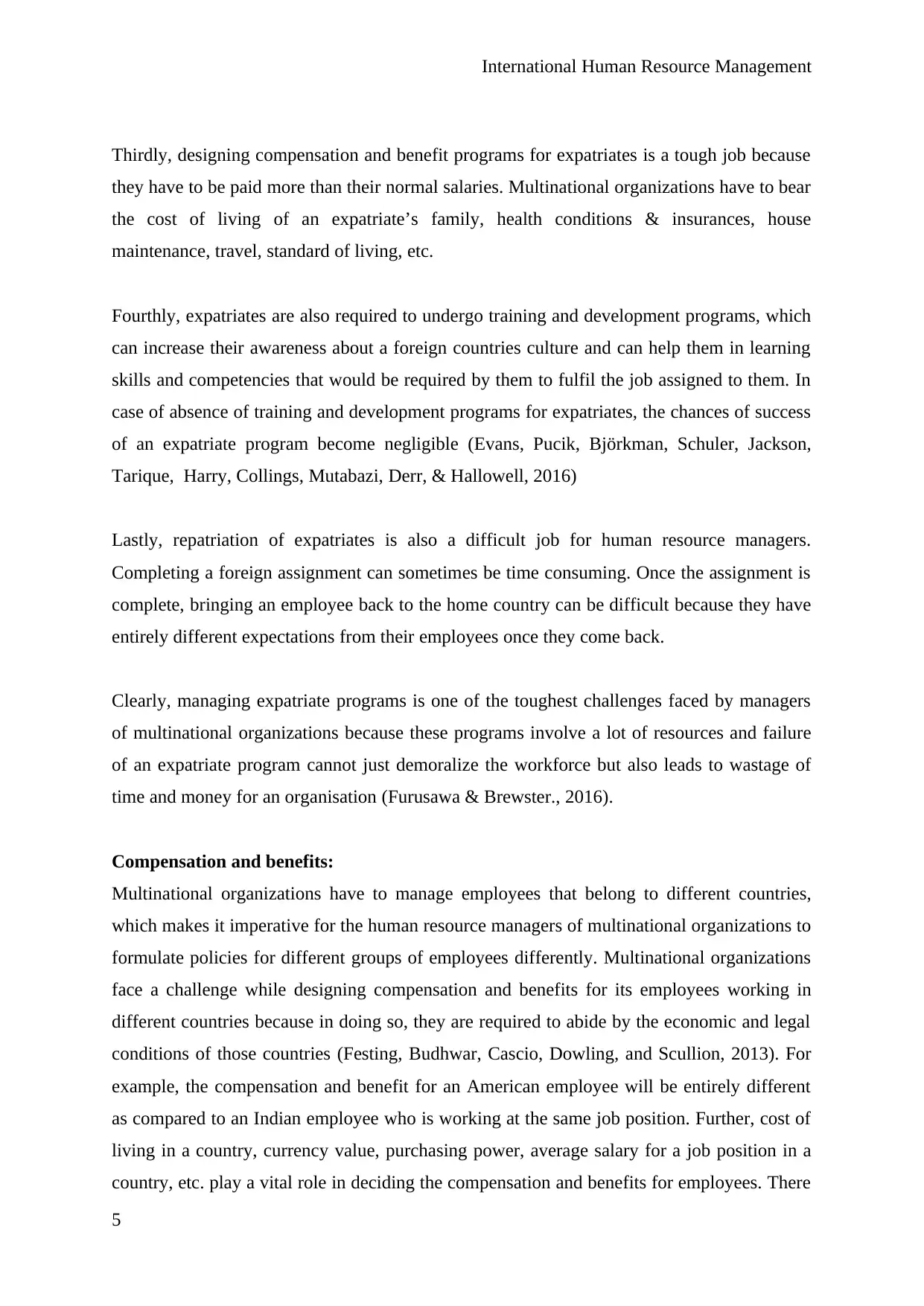
International Human Resource Management
Thirdly, designing compensation and benefit programs for expatriates is a tough job because
they have to be paid more than their normal salaries. Multinational organizations have to bear
the cost of living of an expatriate’s family, health conditions & insurances, house
maintenance, travel, standard of living, etc.
Fourthly, expatriates are also required to undergo training and development programs, which
can increase their awareness about a foreign countries culture and can help them in learning
skills and competencies that would be required by them to fulfil the job assigned to them. In
case of absence of training and development programs for expatriates, the chances of success
of an expatriate program become negligible (Evans, Pucik, Björkman, Schuler, Jackson,
Tarique, Harry, Collings, Mutabazi, Derr, & Hallowell, 2016)
Lastly, repatriation of expatriates is also a difficult job for human resource managers.
Completing a foreign assignment can sometimes be time consuming. Once the assignment is
complete, bringing an employee back to the home country can be difficult because they have
entirely different expectations from their employees once they come back.
Clearly, managing expatriate programs is one of the toughest challenges faced by managers
of multinational organizations because these programs involve a lot of resources and failure
of an expatriate program cannot just demoralize the workforce but also leads to wastage of
time and money for an organisation (Furusawa & Brewster., 2016).
Compensation and benefits:
Multinational organizations have to manage employees that belong to different countries,
which makes it imperative for the human resource managers of multinational organizations to
formulate policies for different groups of employees differently. Multinational organizations
face a challenge while designing compensation and benefits for its employees working in
different countries because in doing so, they are required to abide by the economic and legal
conditions of those countries (Festing, Budhwar, Cascio, Dowling, and Scullion, 2013). For
example, the compensation and benefit for an American employee will be entirely different
as compared to an Indian employee who is working at the same job position. Further, cost of
living in a country, currency value, purchasing power, average salary for a job position in a
country, etc. play a vital role in deciding the compensation and benefits for employees. There
5
Thirdly, designing compensation and benefit programs for expatriates is a tough job because
they have to be paid more than their normal salaries. Multinational organizations have to bear
the cost of living of an expatriate’s family, health conditions & insurances, house
maintenance, travel, standard of living, etc.
Fourthly, expatriates are also required to undergo training and development programs, which
can increase their awareness about a foreign countries culture and can help them in learning
skills and competencies that would be required by them to fulfil the job assigned to them. In
case of absence of training and development programs for expatriates, the chances of success
of an expatriate program become negligible (Evans, Pucik, Björkman, Schuler, Jackson,
Tarique, Harry, Collings, Mutabazi, Derr, & Hallowell, 2016)
Lastly, repatriation of expatriates is also a difficult job for human resource managers.
Completing a foreign assignment can sometimes be time consuming. Once the assignment is
complete, bringing an employee back to the home country can be difficult because they have
entirely different expectations from their employees once they come back.
Clearly, managing expatriate programs is one of the toughest challenges faced by managers
of multinational organizations because these programs involve a lot of resources and failure
of an expatriate program cannot just demoralize the workforce but also leads to wastage of
time and money for an organisation (Furusawa & Brewster., 2016).
Compensation and benefits:
Multinational organizations have to manage employees that belong to different countries,
which makes it imperative for the human resource managers of multinational organizations to
formulate policies for different groups of employees differently. Multinational organizations
face a challenge while designing compensation and benefits for its employees working in
different countries because in doing so, they are required to abide by the economic and legal
conditions of those countries (Festing, Budhwar, Cascio, Dowling, and Scullion, 2013). For
example, the compensation and benefit for an American employee will be entirely different
as compared to an Indian employee who is working at the same job position. Further, cost of
living in a country, currency value, purchasing power, average salary for a job position in a
country, etc. play a vital role in deciding the compensation and benefits for employees. There
5
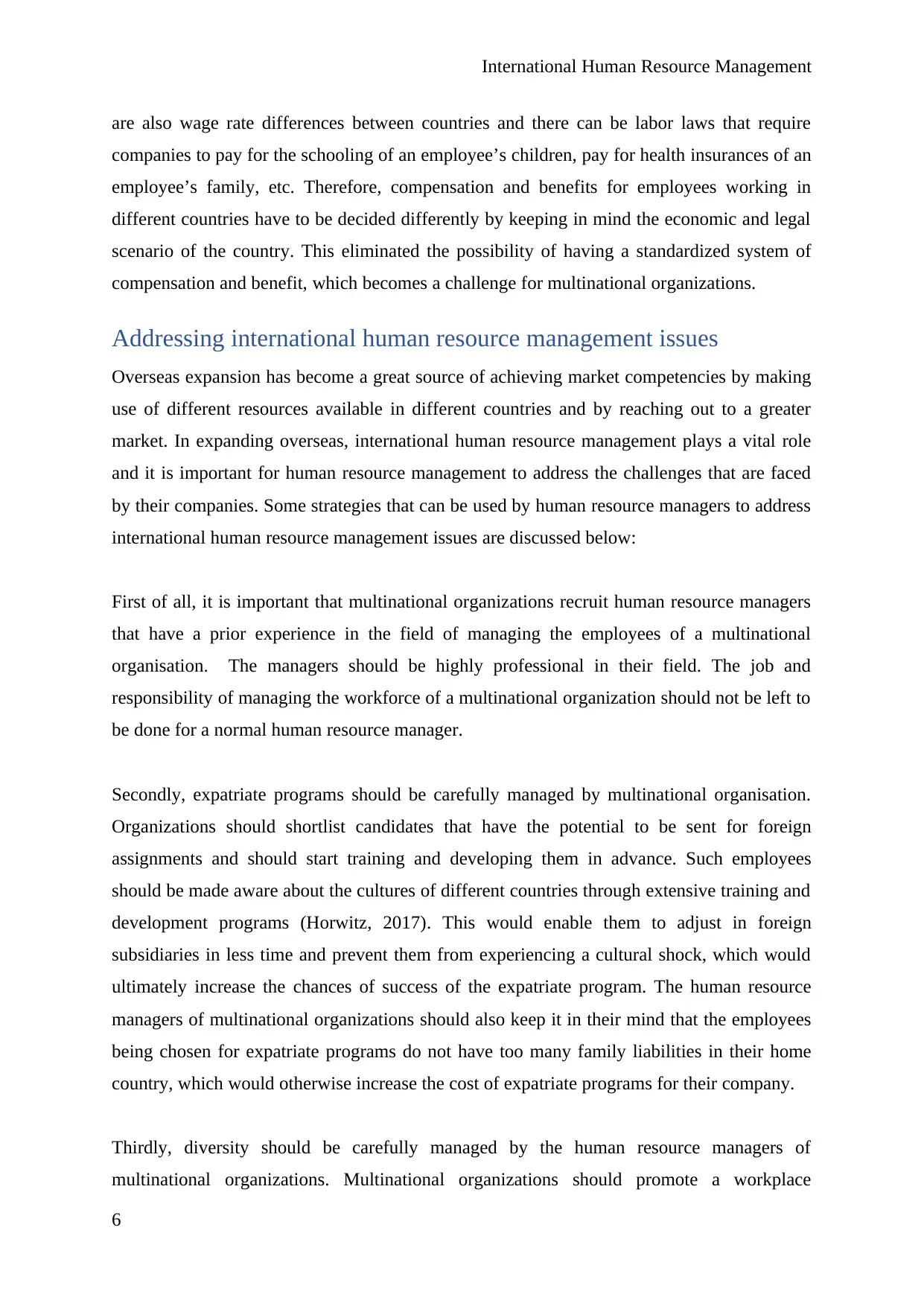
International Human Resource Management
are also wage rate differences between countries and there can be labor laws that require
companies to pay for the schooling of an employee’s children, pay for health insurances of an
employee’s family, etc. Therefore, compensation and benefits for employees working in
different countries have to be decided differently by keeping in mind the economic and legal
scenario of the country. This eliminated the possibility of having a standardized system of
compensation and benefit, which becomes a challenge for multinational organizations.
Addressing international human resource management issues
Overseas expansion has become a great source of achieving market competencies by making
use of different resources available in different countries and by reaching out to a greater
market. In expanding overseas, international human resource management plays a vital role
and it is important for human resource management to address the challenges that are faced
by their companies. Some strategies that can be used by human resource managers to address
international human resource management issues are discussed below:
First of all, it is important that multinational organizations recruit human resource managers
that have a prior experience in the field of managing the employees of a multinational
organisation. The managers should be highly professional in their field. The job and
responsibility of managing the workforce of a multinational organization should not be left to
be done for a normal human resource manager.
Secondly, expatriate programs should be carefully managed by multinational organisation.
Organizations should shortlist candidates that have the potential to be sent for foreign
assignments and should start training and developing them in advance. Such employees
should be made aware about the cultures of different countries through extensive training and
development programs (Horwitz, 2017). This would enable them to adjust in foreign
subsidiaries in less time and prevent them from experiencing a cultural shock, which would
ultimately increase the chances of success of the expatriate program. The human resource
managers of multinational organizations should also keep it in their mind that the employees
being chosen for expatriate programs do not have too many family liabilities in their home
country, which would otherwise increase the cost of expatriate programs for their company.
Thirdly, diversity should be carefully managed by the human resource managers of
multinational organizations. Multinational organizations should promote a workplace
6
are also wage rate differences between countries and there can be labor laws that require
companies to pay for the schooling of an employee’s children, pay for health insurances of an
employee’s family, etc. Therefore, compensation and benefits for employees working in
different countries have to be decided differently by keeping in mind the economic and legal
scenario of the country. This eliminated the possibility of having a standardized system of
compensation and benefit, which becomes a challenge for multinational organizations.
Addressing international human resource management issues
Overseas expansion has become a great source of achieving market competencies by making
use of different resources available in different countries and by reaching out to a greater
market. In expanding overseas, international human resource management plays a vital role
and it is important for human resource management to address the challenges that are faced
by their companies. Some strategies that can be used by human resource managers to address
international human resource management issues are discussed below:
First of all, it is important that multinational organizations recruit human resource managers
that have a prior experience in the field of managing the employees of a multinational
organisation. The managers should be highly professional in their field. The job and
responsibility of managing the workforce of a multinational organization should not be left to
be done for a normal human resource manager.
Secondly, expatriate programs should be carefully managed by multinational organisation.
Organizations should shortlist candidates that have the potential to be sent for foreign
assignments and should start training and developing them in advance. Such employees
should be made aware about the cultures of different countries through extensive training and
development programs (Horwitz, 2017). This would enable them to adjust in foreign
subsidiaries in less time and prevent them from experiencing a cultural shock, which would
ultimately increase the chances of success of the expatriate program. The human resource
managers of multinational organizations should also keep it in their mind that the employees
being chosen for expatriate programs do not have too many family liabilities in their home
country, which would otherwise increase the cost of expatriate programs for their company.
Thirdly, diversity should be carefully managed by the human resource managers of
multinational organizations. Multinational organizations should promote a workplace
6
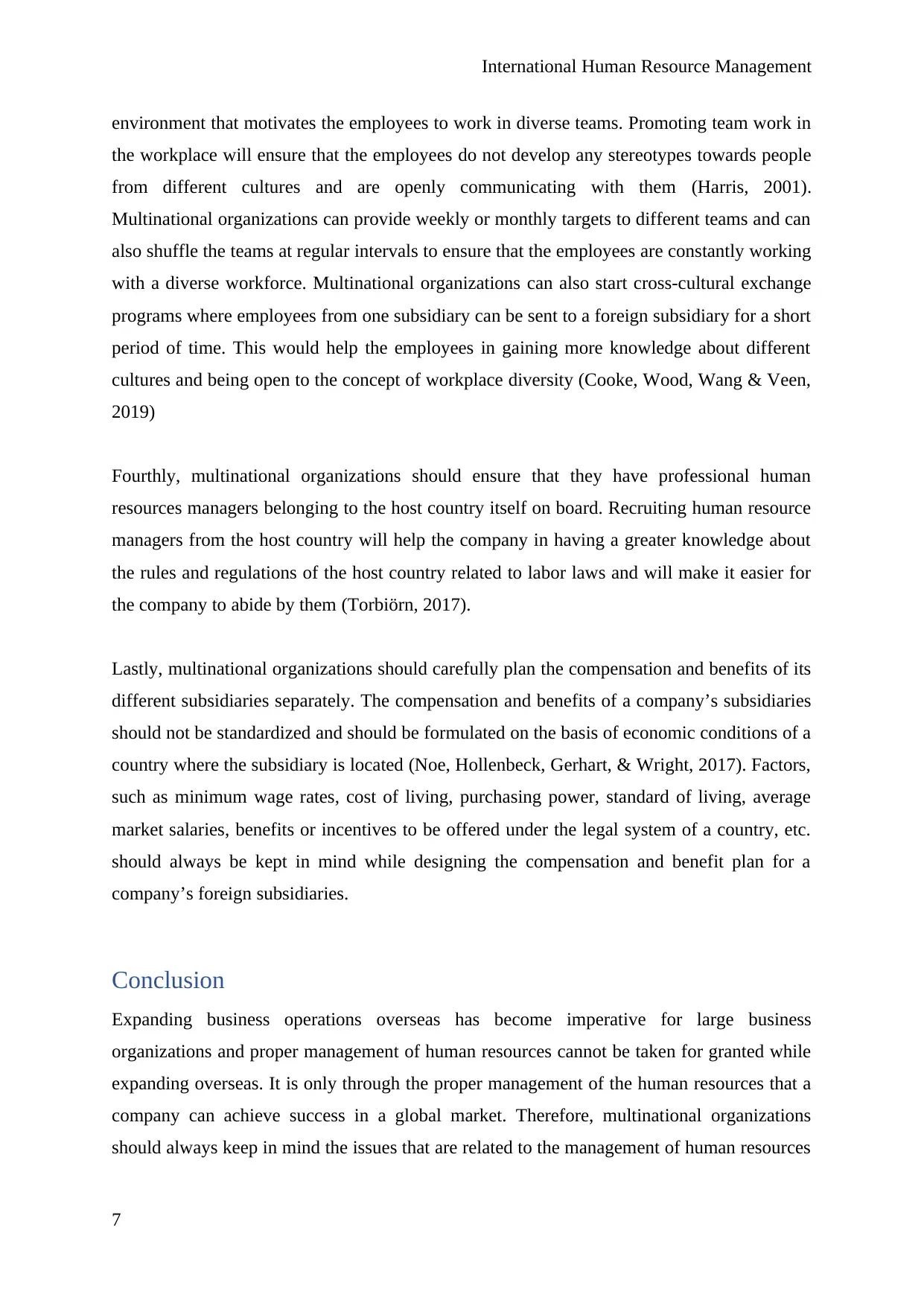
International Human Resource Management
environment that motivates the employees to work in diverse teams. Promoting team work in
the workplace will ensure that the employees do not develop any stereotypes towards people
from different cultures and are openly communicating with them (Harris, 2001).
Multinational organizations can provide weekly or monthly targets to different teams and can
also shuffle the teams at regular intervals to ensure that the employees are constantly working
with a diverse workforce. Multinational organizations can also start cross-cultural exchange
programs where employees from one subsidiary can be sent to a foreign subsidiary for a short
period of time. This would help the employees in gaining more knowledge about different
cultures and being open to the concept of workplace diversity (Cooke, Wood, Wang & Veen,
2019)
Fourthly, multinational organizations should ensure that they have professional human
resources managers belonging to the host country itself on board. Recruiting human resource
managers from the host country will help the company in having a greater knowledge about
the rules and regulations of the host country related to labor laws and will make it easier for
the company to abide by them (Torbiörn, 2017).
Lastly, multinational organizations should carefully plan the compensation and benefits of its
different subsidiaries separately. The compensation and benefits of a company’s subsidiaries
should not be standardized and should be formulated on the basis of economic conditions of a
country where the subsidiary is located (Noe, Hollenbeck, Gerhart, & Wright, 2017). Factors,
such as minimum wage rates, cost of living, purchasing power, standard of living, average
market salaries, benefits or incentives to be offered under the legal system of a country, etc.
should always be kept in mind while designing the compensation and benefit plan for a
company’s foreign subsidiaries.
Conclusion
Expanding business operations overseas has become imperative for large business
organizations and proper management of human resources cannot be taken for granted while
expanding overseas. It is only through the proper management of the human resources that a
company can achieve success in a global market. Therefore, multinational organizations
should always keep in mind the issues that are related to the management of human resources
7
environment that motivates the employees to work in diverse teams. Promoting team work in
the workplace will ensure that the employees do not develop any stereotypes towards people
from different cultures and are openly communicating with them (Harris, 2001).
Multinational organizations can provide weekly or monthly targets to different teams and can
also shuffle the teams at regular intervals to ensure that the employees are constantly working
with a diverse workforce. Multinational organizations can also start cross-cultural exchange
programs where employees from one subsidiary can be sent to a foreign subsidiary for a short
period of time. This would help the employees in gaining more knowledge about different
cultures and being open to the concept of workplace diversity (Cooke, Wood, Wang & Veen,
2019)
Fourthly, multinational organizations should ensure that they have professional human
resources managers belonging to the host country itself on board. Recruiting human resource
managers from the host country will help the company in having a greater knowledge about
the rules and regulations of the host country related to labor laws and will make it easier for
the company to abide by them (Torbiörn, 2017).
Lastly, multinational organizations should carefully plan the compensation and benefits of its
different subsidiaries separately. The compensation and benefits of a company’s subsidiaries
should not be standardized and should be formulated on the basis of economic conditions of a
country where the subsidiary is located (Noe, Hollenbeck, Gerhart, & Wright, 2017). Factors,
such as minimum wage rates, cost of living, purchasing power, standard of living, average
market salaries, benefits or incentives to be offered under the legal system of a country, etc.
should always be kept in mind while designing the compensation and benefit plan for a
company’s foreign subsidiaries.
Conclusion
Expanding business operations overseas has become imperative for large business
organizations and proper management of human resources cannot be taken for granted while
expanding overseas. It is only through the proper management of the human resources that a
company can achieve success in a global market. Therefore, multinational organizations
should always keep in mind the issues that are related to the management of human resources
7
Paraphrase This Document
Need a fresh take? Get an instant paraphrase of this document with our AI Paraphraser
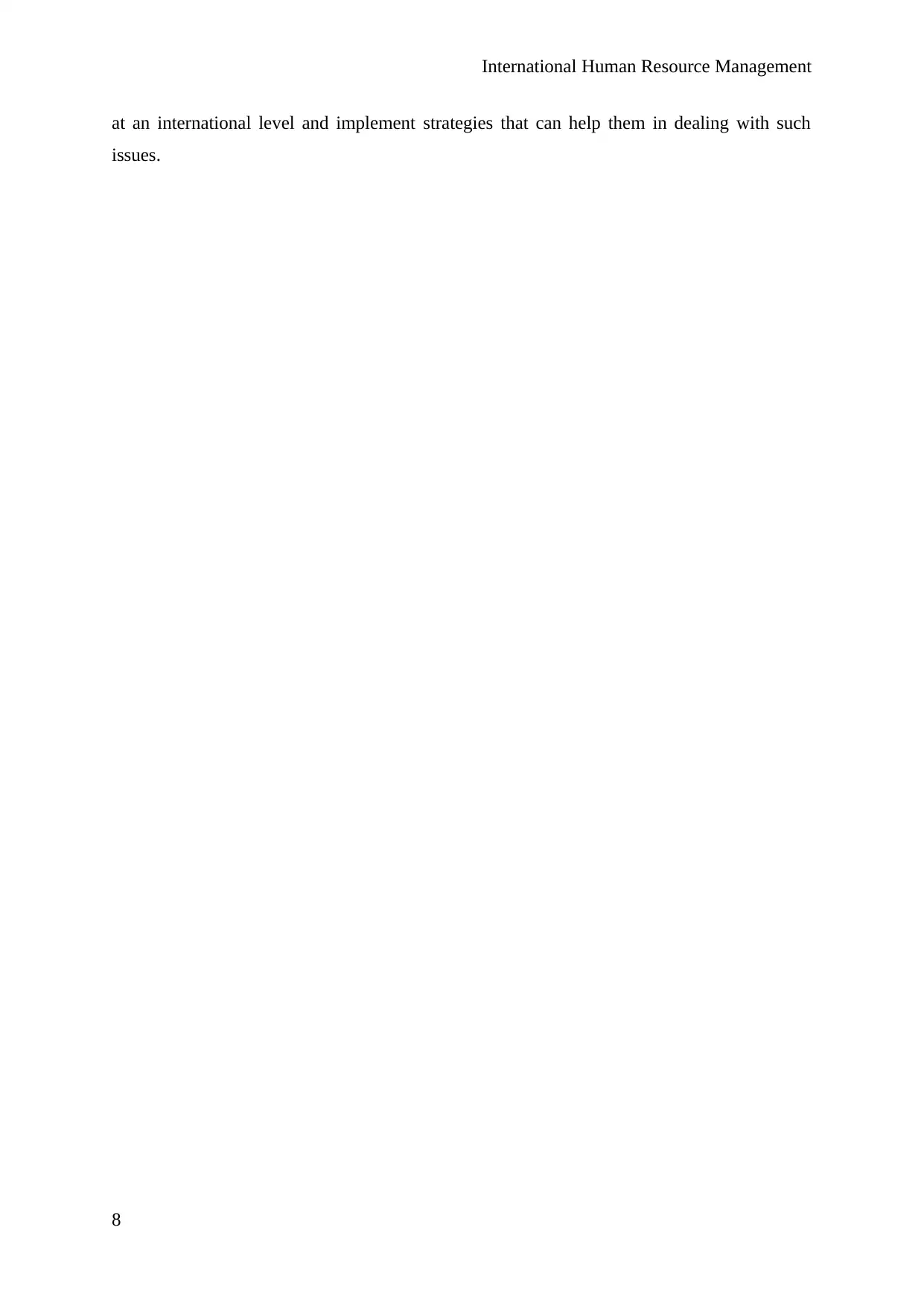
International Human Resource Management
at an international level and implement strategies that can help them in dealing with such
issues.
8
at an international level and implement strategies that can help them in dealing with such
issues.
8
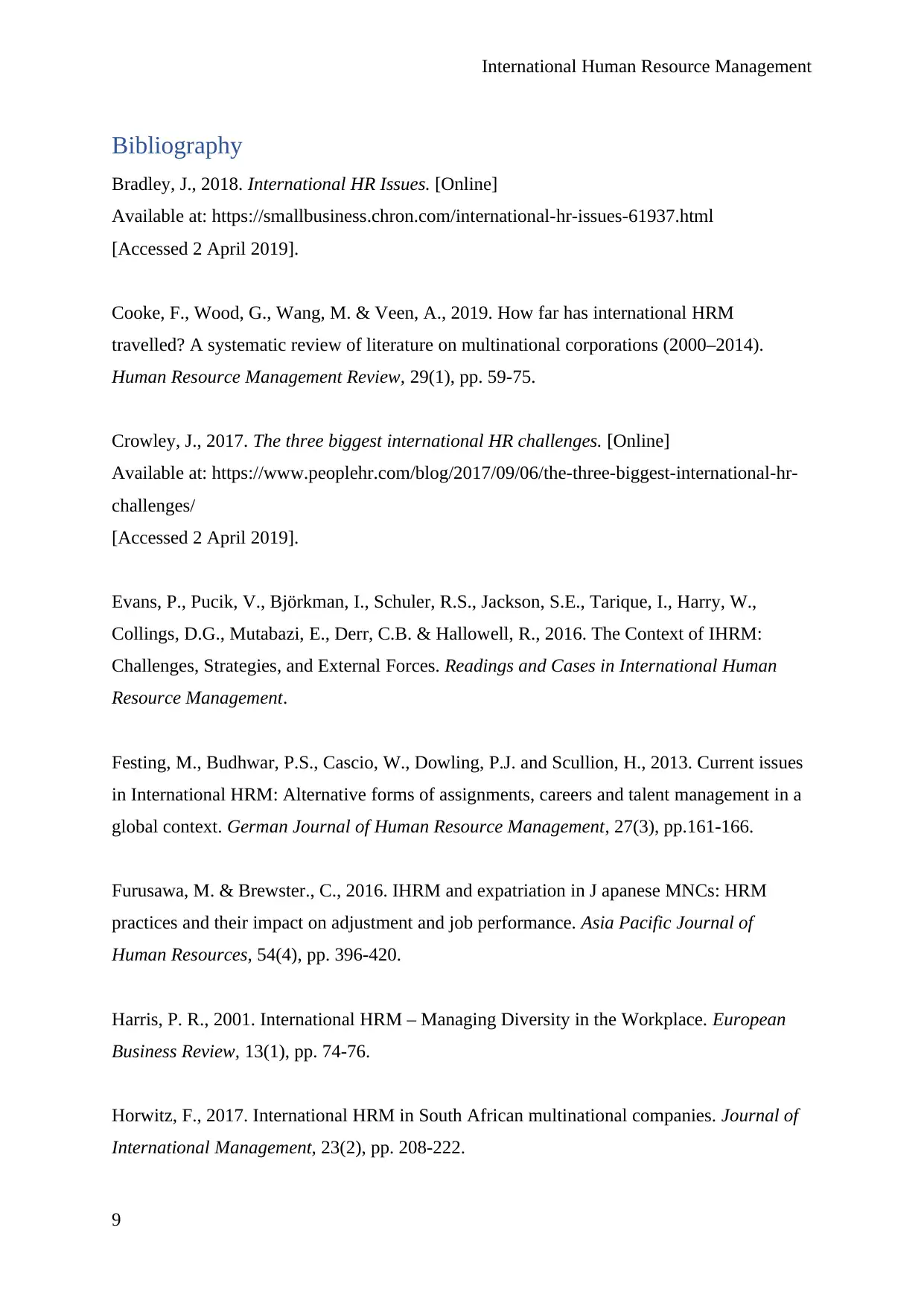
International Human Resource Management
Bibliography
Bradley, J., 2018. International HR Issues. [Online]
Available at: https://smallbusiness.chron.com/international-hr-issues-61937.html
[Accessed 2 April 2019].
Cooke, F., Wood, G., Wang, M. & Veen, A., 2019. How far has international HRM
travelled? A systematic review of literature on multinational corporations (2000–2014).
Human Resource Management Review, 29(1), pp. 59-75.
Crowley, J., 2017. The three biggest international HR challenges. [Online]
Available at: https://www.peoplehr.com/blog/2017/09/06/the-three-biggest-international-hr-
challenges/
[Accessed 2 April 2019].
Evans, P., Pucik, V., Björkman, I., Schuler, R.S., Jackson, S.E., Tarique, I., Harry, W.,
Collings, D.G., Mutabazi, E., Derr, C.B. & Hallowell, R., 2016. The Context of IHRM:
Challenges, Strategies, and External Forces. Readings and Cases in International Human
Resource Management.
Festing, M., Budhwar, P.S., Cascio, W., Dowling, P.J. and Scullion, H., 2013. Current issues
in International HRM: Alternative forms of assignments, careers and talent management in a
global context. German Journal of Human Resource Management, 27(3), pp.161-166.
Furusawa, M. & Brewster., C., 2016. IHRM and expatriation in J apanese MNCs: HRM
practices and their impact on adjustment and job performance. Asia Pacific Journal of
Human Resources, 54(4), pp. 396-420.
Harris, P. R., 2001. International HRM – Managing Diversity in the Workplace. European
Business Review, 13(1), pp. 74-76.
Horwitz, F., 2017. International HRM in South African multinational companies. Journal of
International Management, 23(2), pp. 208-222.
9
Bibliography
Bradley, J., 2018. International HR Issues. [Online]
Available at: https://smallbusiness.chron.com/international-hr-issues-61937.html
[Accessed 2 April 2019].
Cooke, F., Wood, G., Wang, M. & Veen, A., 2019. How far has international HRM
travelled? A systematic review of literature on multinational corporations (2000–2014).
Human Resource Management Review, 29(1), pp. 59-75.
Crowley, J., 2017. The three biggest international HR challenges. [Online]
Available at: https://www.peoplehr.com/blog/2017/09/06/the-three-biggest-international-hr-
challenges/
[Accessed 2 April 2019].
Evans, P., Pucik, V., Björkman, I., Schuler, R.S., Jackson, S.E., Tarique, I., Harry, W.,
Collings, D.G., Mutabazi, E., Derr, C.B. & Hallowell, R., 2016. The Context of IHRM:
Challenges, Strategies, and External Forces. Readings and Cases in International Human
Resource Management.
Festing, M., Budhwar, P.S., Cascio, W., Dowling, P.J. and Scullion, H., 2013. Current issues
in International HRM: Alternative forms of assignments, careers and talent management in a
global context. German Journal of Human Resource Management, 27(3), pp.161-166.
Furusawa, M. & Brewster., C., 2016. IHRM and expatriation in J apanese MNCs: HRM
practices and their impact on adjustment and job performance. Asia Pacific Journal of
Human Resources, 54(4), pp. 396-420.
Harris, P. R., 2001. International HRM – Managing Diversity in the Workplace. European
Business Review, 13(1), pp. 74-76.
Horwitz, F., 2017. International HRM in South African multinational companies. Journal of
International Management, 23(2), pp. 208-222.
9
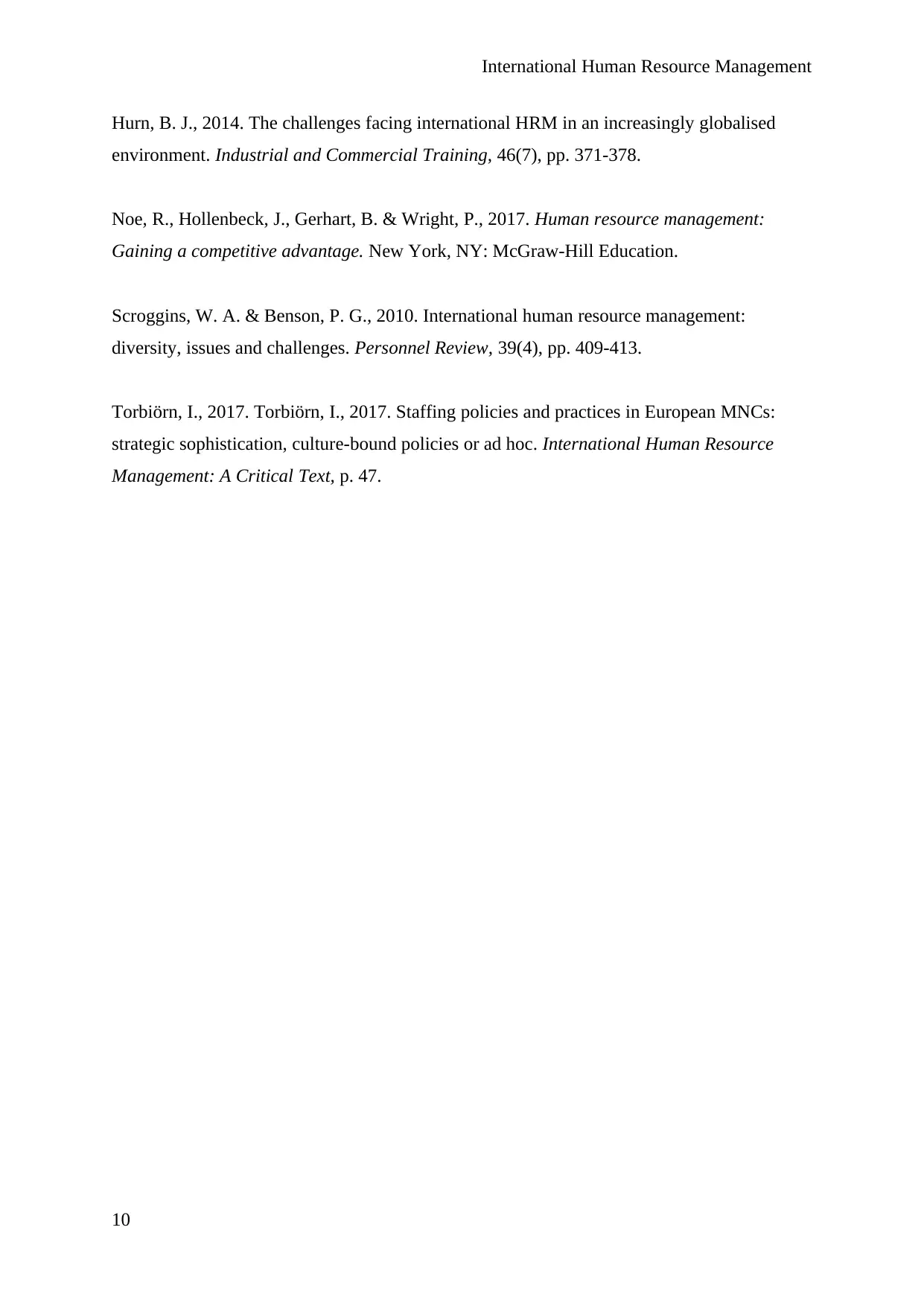
International Human Resource Management
Hurn, B. J., 2014. The challenges facing international HRM in an increasingly globalised
environment. Industrial and Commercial Training, 46(7), pp. 371-378.
Noe, R., Hollenbeck, J., Gerhart, B. & Wright, P., 2017. Human resource management:
Gaining a competitive advantage. New York, NY: McGraw-Hill Education.
Scroggins, W. A. & Benson, P. G., 2010. International human resource management:
diversity, issues and challenges. Personnel Review, 39(4), pp. 409-413.
Torbiörn, I., 2017. Torbiörn, I., 2017. Staffing policies and practices in European MNCs:
strategic sophistication, culture-bound policies or ad hoc. International Human Resource
Management: A Critical Text, p. 47.
10
Hurn, B. J., 2014. The challenges facing international HRM in an increasingly globalised
environment. Industrial and Commercial Training, 46(7), pp. 371-378.
Noe, R., Hollenbeck, J., Gerhart, B. & Wright, P., 2017. Human resource management:
Gaining a competitive advantage. New York, NY: McGraw-Hill Education.
Scroggins, W. A. & Benson, P. G., 2010. International human resource management:
diversity, issues and challenges. Personnel Review, 39(4), pp. 409-413.
Torbiörn, I., 2017. Torbiörn, I., 2017. Staffing policies and practices in European MNCs:
strategic sophistication, culture-bound policies or ad hoc. International Human Resource
Management: A Critical Text, p. 47.
10
1 out of 10
Related Documents
Your All-in-One AI-Powered Toolkit for Academic Success.
+13062052269
info@desklib.com
Available 24*7 on WhatsApp / Email
![[object Object]](/_next/static/media/star-bottom.7253800d.svg)
Unlock your academic potential
© 2024 | Zucol Services PVT LTD | All rights reserved.




